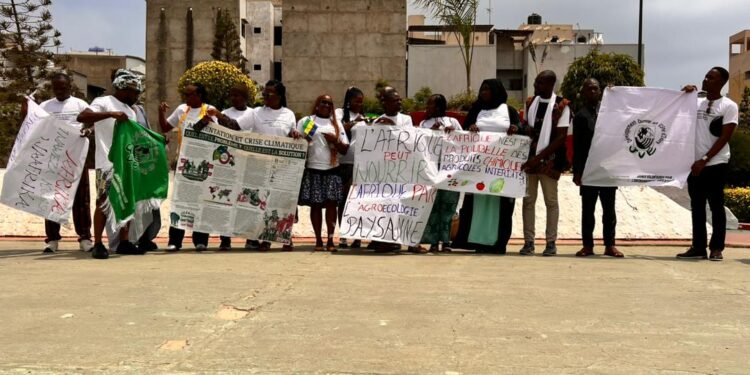Story, Louvier Kindo Tombe
In the heart of the Congo Basin, a silent revolution is underway. Blondel Silenou, a soft-spoken Cameroonian, is leading the charge against chemical colonization and towards a greener future.
His movement, KILIMO EKOLOJIA, is spreading like wildfire among young farmers tired of being treated as second-class global citizens.
Silenou’s journey began with a harsh realization: Africa is being used as a dumping ground for banned pesticides. “It’s chemical colonization,” he says bluntly.
“They wouldn’t dare spray this poison on their own children’s food, but somehow it’s perfectly fine for ours.”
This sparked the birth of KILIMO EKOLOJIA, a movement that empowers young farmers to take control of their agricultural future.
In a modest courtyard in Cameroon, Silenou runs a makeshift classroom where urban youth learn ancient techniques: reading soil health, planting complementary crops, and extracting natural pesticides from neem trees.
“My grandmother never stepped foot in an agricultural college, yet she fed twelve children without ever buying a single chemical fertilizer,” Silenou explains.
 His approach is refreshingly practical: rotate crops, use kitchen scraps for compost, and plant nitrogen-fixing beans alongside maize.
His approach is refreshingly practical: rotate crops, use kitchen scraps for compost, and plant nitrogen-fixing beans alongside maize.
With 65% of the Congo Basin’s population under 25, Silenou is tapping into Africa’s greatest resource – its young people.
KILIMO EKOLOJIA puts them in charge, empowering them to solve their own problems using their own knowledge. The results are promising: young farmers are feeding their communities, building soil health, and staying on their land.
Silenou’s pragmatic approach to systemic change is what sets him apart. While teaching composting in Cameroon, he’s lobbying for regional policy harmonization to prevent toxic pesticides from crossing borders.
His next milestone: the Congo Basin’s first regional academy for peasant agroecology, designed to train trainers who’ll return home and teach others.

Silenou’s quiet confidence is striking. He speaks about transforming Central Africa’s food systems with matter-of-fact certainty.
“Africa can feed Africa,” he says. “We just need to stop poisoning ourselves first.”
His approach is almost radically simple: trust African farmers, support African youth, and rediscover African wisdom.
The revolution he’s leading doesn’t require billions in foreign aid or cutting-edge technology. It just requires remembering what Africa knew before the world convinced it to forget.
As the world looks for complex solutions to food security, Silenou’s movement offers a refreshing alternative. By empowering young farmers and promoting sustainable agriculture, KILIMO EKOLOJIA is rewriting Africa’s agricultural future – one compost heap at a time.








